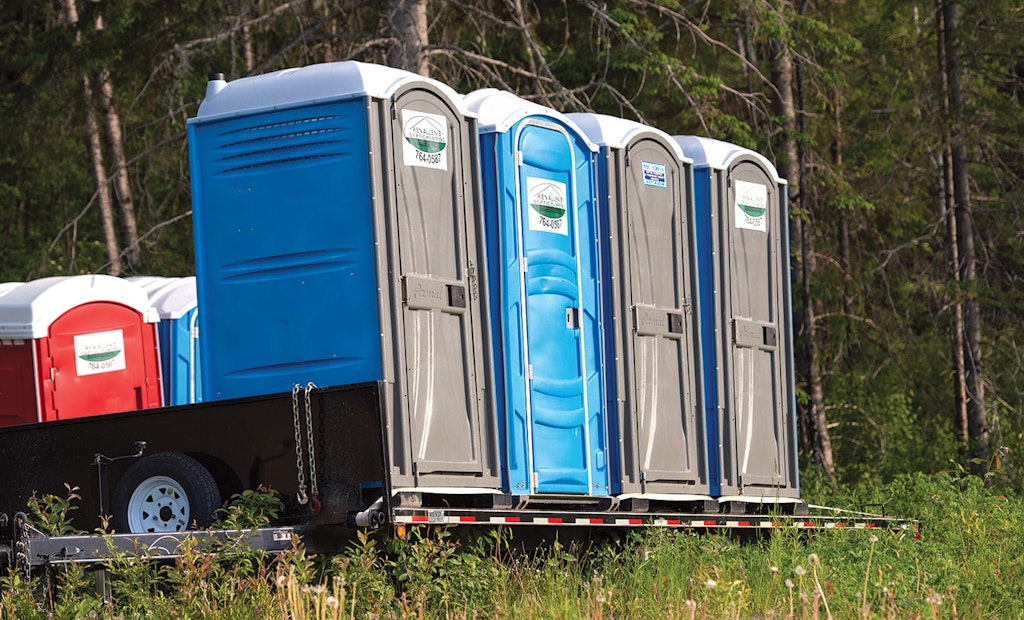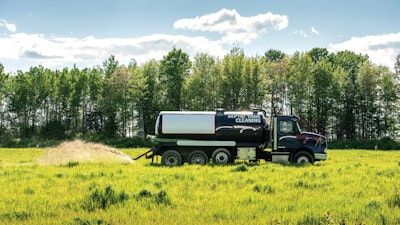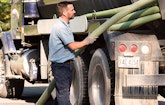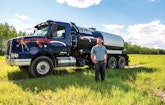
Ken Allen’s Septic has an inventory of restrooms from Armal, Satellite | PolyPortables and PolyJohn Enterprises. The company uses a Wesco trailer frame customized by Lane’s Vacuum Tank to transport the units.
Caught between fast-rising disposal costs, restrictive disposal policies at local treatment plants and the closure of municipal land application sites, Caston Lovely — the owner of Ken Allen’s Septic in Presque Isle, Maine — was increasingly alarmed by the shrinking profit margins at the company his grandfather established in 1957.
The solution: purchase 50 acres of farmland on the outskirts of Presque Isle that now handles an average of about 500,000 gallons of land-applied waste annually. “We basically ensured the future of our company,” says Lovely, 34, noting that he land-applies about 95% of the septage he collects. “Financially, it really tipped the scales in our favor.
“Sure, land is expensive and there’s upkeep involved, too,” he continues. “But so far the advantages have far outweighed the disadvantages.”
Furthermore, owning property for land application essentially future-proofs the company against whatever other unexpected events might disrupt local waste-disposal options, such as more price hikes, even more restrictive acceptance policies or even plant closings.
“You just don’t know how things will change in the future when it comes to waste disposal,” Lovely says. “So far, all the changes that have occurred around here have affected us negatively, so I wouldn’t expect them to get better going forward. We decided we’d rather be masters of our own destiny.”
In addition, Lovely also adds a per-gallon surcharge to the company’s flat rate for pumping tanks. That charge is equal to the local going rate for disposing of septage. “So we’re making that money rather than giving it away (to a treatment facility),” he notes.
Lovely’s situation will resonate with pumpers nationwide who face increasingly higher waste-disposal costs. Of course, land application isn’t allowed everywhere. And even where it is allowed, getting site approval can be a costly, time-consuming process that requires jumping through myriad regulatory hoops.
It also can entail contending with antagonistic owners of neighboring properties who oppose land application. But the financial benefits often make navigating the headwinds a worthwhile endeavor, according to Lovely.
One important caveat also applies: Lovely says pumpers must collect enough waste to make land application economically feasible. If pumpers already own land that qualifies for land application, that’s one thing. If not, pumpers need to be sure they’ll save enough money through reduced disposal costs to make mortgage payments on the acquired land, he says.
A HISTORY OF SPREADING
Lovely is no stranger to land-applying waste. His grandfather, Ken Allen, did so for decades. And many of the neighboring towns around Presque Isle used to own their own land application sites. “We’ve always relied on a mix of land-applying on people’s personal property or on municipal-owned land and (to a lesser extent) on wastewater treatment plants,” he says.
That started to change about 15 years ago, when a local landfill built a sewage dewatering facility. One by one, local municipalities — motivated by a chance to streamline operations — contracted with the landfill to handle their septage, which allowed them to close their land application sites, Lovely says.
At one point, only two local municipal land application sites remained open, and eventually officials decided to only accept waste generated within their municipal boundaries. Moreover, disposal rates at local treatment centers continued to rise, and one facility even temporarily stopped taking waste because disposal demand had outstripped its capacity, Lovely says.
Simply put, the disposal situation was putting a big dent in the company’s profit margins. Plus, fuel prices at the time were exceeding $4 a gallon. “We started getting passionate about alternative sources for waste disposal when we realized the treatment centers were making more on disposal fees than we were making on pumping out tanks,” he says.
“That’s when the gears started turning in my head, even though I didn’t even own the company yet,” he adds. “I talked to the Maine Department of Environmental Protection about the possibility of land-applying waste.”
THE SEARCH BEGINS
That initial inquiry led Lovely on a four-year search for a parcel of land that met Maine Department of Environmental Protection requirements. To cut down on legwork, he used Google Earth satellite maps to scope out potential properties.
While laws vary from state to state, Maine regulations require sites to meet certain requirements such as passing soil tests, analysis of the sand and gravel aquifer, minimum setbacks and buffer zones, daily vehicular traffic estimates, proximity to bodies of water, expected volume of septage and so forth.
“It was extremely difficult to find a property that met all the requirements,” he says. At one point, he found a viable parcel but the purchase was derailed by three-years’ worth of legal proceedings initiated by neighboring residents who opposed it.
But Lovely finally found the 50-acre parcel, which is only 4 miles from his company’s shop. The land was mostly wooded and he cleared it. Fortunately, the land is adjacent to a municipal property that also stores and land-applies waste, which minimized residents’ opposition. “People who live around there were already used to seeing trucks come through several times a day,” he says.
The company is permitted to land-apply waste on 15 acres of the parcel. Lovely is allowed to expand that area, if need be, but not to the full 50 acres, he explains.
Generally, the company land-applies waste May through early November. To apply septage, the company uses a self-fabricated spreader that attaches to the rear of a pump truck.
For the rest of the year, Lovely hauls what little septage he collects to a treatment facility in Presque Isle. But he’s applying for permission to store waste in belowground tanks (with 50,000 gallons of total capacity) during winter and rainy periods, when land application isn’t allowed. The tanks would be located on the 50-acre parcel.
To pump out septic tanks, the company relies on a 1994 White/GMC HD chassis with a 3,500-gallon steel tank, equipped with a Moro USA pump; and a 2002 Volvo VHD chassis outfitted by Keith Huber with a 4,500-gallon steel tank featuring a pump built by Utile Engineering. The company also owns a Hitachi Zaxis 26U mini-excavator, RIDGID pipeline locator and Prototek sonde to find tank lids.
PORTABLE RESTROOMS
To generate some additional revenue, the company also carries about 40 restrooms, an inventory mix from Armal, Satellite | PolyPortables and PolyJohn Enterprises. It also owns two hand-wash stations from Satellite | PolyPortables and uses deodorizers and scented discs from Walex Products. To service restrooms, the company invested in a 2002 International 4300 with a 1,000-gallon waste and 500-gallon freshwater steel tank from Keith Huber with a Masport pump. Lovely prefers a restroom service truck with a tank on the larger side.
“We do a lot of large special events where there are lots of campers with RVs that need waste tanks pumped,” he explains. “So with that bigger tank, we’re not running back and forth all the time for dumping.”
One of the bigger events the company handled last year was BikeMaine, a weeklong, nearly 400-mile bicycle tour. In 2018, 450 cyclists participated. “We had 40 units on the ground and had to shuttle them around to different locations throughout the week,” Lovely explains. “We collaborated on the event with another restroom provider.”
To pick up and deliver restrooms, the company uses a Wesco flatbed trailer frame that was customized by Lane’s Vacuum Tank; it carries 10 standard restrooms, and the truck can hold two.
BUILDING THE LEGACY
Lovely cares deeply about the company and its customers, many of whom he’s known since he was as a youngster helping out his grandfather, who died in 2018. “I used to ride in the truck with him when I was around 6 years old,” he says. “And I worked with him during summers when I was in school. I was always very close to him because he practically raised me.”
During his high school years, Lovely gained more valuable experience by working for his uncle, Chris Allen, the owner of Allen’s Environmental Services.
After graduating from high school, Lovely operated heavy equipment for a logging company, then did the same for an earthmoving company. He quit that job about a decade ago to help out his grandfather, who’d been diagnosed with cancer. “Since I had experience working with him, he asked me to run his truck,” he says. “It worked out well because I already knew a lot of the customers and where things were.”
Since buying the company in 2010, Lovely has worked hard to maintain his grandfather’s legacy of providing great customer service at a fair price. About two-thirds of the pumping is residential and the rest is servicing commercial accounts.
Given that he’s a one-man operation when it comes to pumping tanks — he says he routinely puts in 70-hour workweeks during peak season — further company growth isn’t likely. He’d like to eventually hire an employee, but he says finding one with the right work ethic and the willingness to provide a high level of customer service is challenging.
So what keeps Lovely going? “The affirmation from our customers for taking care of them in a timely manner without breaking their bank accounts,” he says. “That’s what keeps the wind in my sails, for the most part. That and preserving my grandpa’s legacy.”
Five top tips for pumpers
Like so many one-person septic pumping companies across the country, Caston Lovely couldn’t make it without significant contributions from his wife, Erica Lovely. In this case, Erica, a business teacher at a local high school, also happens to have a master’s degree in business administration, which helps the company operate at a higher level.
“Erica does a lot of our marketing, especially through Facebook,” Caston says. “She also takes care of all the finances and billing. She has an MBA, so that’s invaluable to the business. And since she’s a teacher and has summers off, she also helps out with large special events (for portable restroom rentals). She’s been so great on the business side of things.”
Based on their years of experience in the industry and Erica’s background, here are five business tips they’ve found beneficial over the years:
1. Remain as debt-free as possible.
2. Consistently stick with methods and processes that work. In the case of Ken Allen’s Septic, that means doing things like returning customer phone calls in a timely manner and cleaning each tank the same way. “We rinse out tanks completely, along with the inlet and outlet ports,” he says. “So customers always start out with a clean slate.”
3. Go above and beyond for customers and be professional. “I look presentable when I get out of the truck and have a smile on my face, ready to tackle the job,” he says. “I look customers in the eye and shake hands.” The company uses Square software for in-the-field credit card payments. And if asked, Caston helps homeowners with other problems such as tracing the source of an unusual odor or cleaning out a sink P-trap — at no extra charge. “The return comes back to us tenfold because they tell all of their friends,” he says.
4. Invest in equipment that helps complete jobs more efficiently and profitably. For instance, if frequent trips to disposal facilities wastes time and racks up additional expense, consider buying a truck with a larger tank. Or install risers to make the next pumping job faster.
5. Take time off. Everyone needs a break, especially during peak season, to avoid burnout. “But you have to schedule it,” he recommends. “If you want to go fishing next Wednesday, you have to schedule it.” But what if customers call with emergencies on a day off? Caston suggests developing a good working relationship with a respected competitor who’d be willing to handle such jobs.










